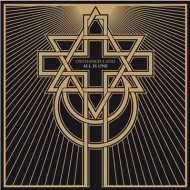 It was a good decade and a half ago that I listened to Orphaned Land for the first time. I really enjoyed their death metal tinged with Middle Eastern spices. Well, Kobi Farhi’s death vocals are pretty much non-existent on this release, but the traditional flavours are far more abundant, along with the use of over 40 musicians for the symphonic sounds of ‘All Is One’. The lyrical content of this album is focussed primarily on the similarities of men, rather than the differences that keep breeding hostility and animosity. Why can’t we all just get along, and as Tim Minchin says “why not, not eat pigs together”? A sentiment I fully condone as a vegetarian.
It was a good decade and a half ago that I listened to Orphaned Land for the first time. I really enjoyed their death metal tinged with Middle Eastern spices. Well, Kobi Farhi’s death vocals are pretty much non-existent on this release, but the traditional flavours are far more abundant, along with the use of over 40 musicians for the symphonic sounds of ‘All Is One’. The lyrical content of this album is focussed primarily on the similarities of men, rather than the differences that keep breeding hostility and animosity. Why can’t we all just get along, and as Tim Minchin says “why not, not eat pigs together”? A sentiment I fully condone as a vegetarian.
The title track opens to tempo being held by flamenco like clapping. “All Is One” has a nice steady beat throughout and incorporates some great heavy guitar along with the aforementioned symphonic instruments to full the sound out completely and let the lead guitar trade-offs truly shine. The choral arrangement is very allegro and lifts the song beautifully.
“The Simple Man” has a pretty, catchy tune where Kobi Farhi’s clear vocals full of emotion and melody become the focus and carry it to perfection.
The first single from the album, which also happens to have a promo video where bassist Uri Zelha is wearing a Mucky Pup shirt, is “Brother”. It’s a slow and moving ballad telling a story of where senseless conflict began, but sadly the following track tells of how they usually end.
The violins on “Let The Truce Be Known” grow steadily to allow the chunky guitars to slip in and take over then fade out to the sound of gunfire, which they wish music could drown out forever. The lead has a haunting mournful quality foretelling the final outcome as the song comes to its conclusion.
Yossi Sassi’s cumbush intro on “Through Fire And Water” is accompanied by tambourines and simple ululating, but this quickly builds up to a fuller sound as more instruments are added to the mix. The female vocal track is powerful and works well as a contrast to Kobi’s.
The vocals on “Fail” are a spoken whisper which morph into a throaty death growl. Yossi Sassi and Chen Balbus’ guitars have driving rhythm which is heavy but ultra-melodic at the same time.
Matan Shmuely’s tribal drum tattoo on “Freedom” is at first accompanied by acoustic then electric guitar and eventually by a bouzouki as it fades out. This instrumental is also the shortest track on the album.
All the Middle Eastern instruments come together on “Shama’im” for a lively and upbeat turn. The choral vocals tone things down a little, nevertheless it’s tracks like these that made this band stand out for me all those years ago when I first heard them.
On a similar pattern “Ya Benaye” has all the traditional elements required but a strong undercurrent of electric guitar to taint the song with the metal edge. The lead isn’t too shabby either for that matter.
“Our Own Messiah” has some pertinent lyrics which combine well with the music on the song where there is a popping bass solo over tribal drums, mellow and powerful guitars chords, lead guitar breaks but most importantly vocal and choral arrangements that prove that may different voices can come together as one to make great music.
The final track also happens to be the longest track on the album and “Children” keeps a nice leisurely pace as it flows along with its heartfelt and mournful vocals, exquisitely picked acoustic guitar and superbly played lead as it all fades out in symphony.
All in all, while the metal roots are still audible, their deeper ancestral musical roots definitely come to the fore on this release making it stand out by their non-traditional approach to both metal and Middle Eastern music.
(8/10 Marco Gaminara)

Leave a Reply